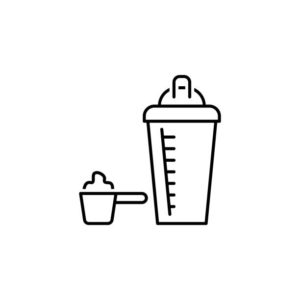Vegan Protein Powders
By Reed Mangels, PhD, RD
We received a question about vegan protein powders. “Someone I work with is trying to cut down on meat and is thinking of using vegan protein powders but heard about toxic levels of heavy metals In some products. Do you have any information on studies about this and what are your thoughts about consuming vegan protein powders?”
I am curious why your colleague feels the need to use a vegan protein powder. Most people can meet protein needs without the use of these products. Your colleague may want to calculate how much protein they need. The Recommended Dietary Allowance for protein for adults is 0.36 grams of protein per pound of body weight. So, someone weighing 150 pounds would need about 54 grams of protein per day. The Vegetarian Resource Group has a helpful table of protein in vegan foods here (see Table 2). Since you mention that they are trying to cut down on meat, it could also be helpful for them to consider that an ounce of meat has about 7 grams of protein, a cup of cow’s milk has 8 grams of protein, and an egg has about 7 grams of protein. If they calculate how much protein they need and look at what they are eating, it’s likely that it will be apparent that protein powders are not necessary. Foods like beans, tofu and other soy products, quinoa, seitan, and nuts and seeds are especially good sources of vegan protein.
If someone is doing a lot of strength training or endurance exercise, they are likely to have higher protein needs. If that is the case for your colleague, they would calculate their protein needs using a factor of 0.55 grams to 0.9 grams of protein per pound of body weight rather than the 0.36 grams of protein per pound. In that case, someone weighing 150 pounds and doing a lot of strength training or endurance exercise would need about 82.5 to 135 grams of protein a day – still possible to get without protein powder, if higher protein foods are chosen. In some cases, vegan protein powders may be helpful for athletes during intensive training periods.
Heavy metals are a group of metals that have toxic effects even from very small amounts. The ones that were tested for in protein powders were arsenic, lead, cadmium, and mercury. These metals can have harmful effects on many body systems including the kidneys, the nervous system, the reproductive system, and the immune system.
A study conducted by the Clean Label Project (a non-profit organization that has a certification program for products that meet their standards) examined heavy metal contamination in 135 protein powders, both vegan and non-vegan (1). They report that nearly 75% of products had measurable levels of lead and that nearly a third of products exceeded at least one federal or state regulatory level for heavy metals (1). Organic certification did not mean that products were not contaminated (1). Plant-protein based products, on average, had higher levels of contamination than products based on egg or whey protein (1). This study was not peer-reviewed.
The Clean Label Project report did not identify products by name.. According to an article in Consumer Reports, five products were identified as having the poorest overall score (2). The score was based on heavy metal content, pesticide content, other contaminants like BPA, and nutrition with heavy metals representing 60% of the overall score (2). Two vegan products were included on the list of products receiving the poorest overall score (2).
Researchers from a for-profit scientific consulting firm examined the Clean Label Project’s results along with an earlier study of non-vegan protein powders conducted by Consumer Reports and concluded that, “the typical intake of dietary supplements [protein powders] would not result in adverse health effects due to heavy metals” (3). This study made some assumptions, including the serving size of the protein powders, that could have affected its results.
Based on the Clean Label Project study results, protein powders can be contaminated with heavy metals. It’s not certain whether or not the amounts found in products are associated with health risks. One consideration could be how frequently products are being used. If someone is using products several times daily, every day, the products’ heavy metal content would be more concerning than if someone uses a protein powder occasionally. If consumers choose to use protein powders, they can contact individual companies to find out if their products are tested for heavy metal contamination and what their results are.
If you are thinking about using protein powders, consider whether or not you really need these products. It may be helpful to work with a Registered Dietitian/Nutritionist to assess your protein needs and the amount of protein in your diet. If you do choose to use a protein powder, be a skeptical consumer and ask companies about their testing practices and results related to heavy metals.
References
- Protein powder. Our point of view. Clean Label Project. https://cleanlabelproject.org/protein-powder-white-paper/ June, 2018.
- Hirsch, J. Arsenic, lead found in popular protein supplements. Consumer Reports. https://www.consumerreports.org/dietary-supplements/heavy-metals-in-protein-supplements/ March, 2018.
- Bandara SB, Towle KM, Monnot AD. A human health risk assessment of heavy metal ingestion among consumers of protein powder supplements. Toxicol Rep. 2020;7:1255-1262.


Dr Greger asserts that meat bioaccumulates heavy metals, so the main source of dietary heavy metals is from animals, not from plants. Perhaps eggs and dairy are an exception, although I think mercury is passed in human breast milk from mother to child, so I don’t see why dairy would be an exception (unless the inputs into animal feed are ‘cleaner’ than inputs into vegan protein powder – which seems exorbitantly unlikely).